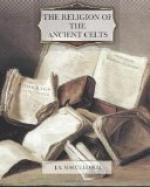Thus a close examination of the position and functions of the Druids explains away two popular misconceptions. They were not possessed of any recondite and esoteric wisdom. And the culling of mistletoe instead of being the most important, was but a subordinate part of their functions.
In Gaul the Roman power broke the sway of the Druids, aided perhaps by the spread of Christianity, but it was Christianity alone which routed them in Ireland and in Britain outside the Roman pale. The Druidic organisation, their power in politics and in the administration of justice, their patriotism, and also their use of human sacrifice and magic, were all obnoxious to the Roman Government, which opposed them mainly on political grounds. Magic and human sacrifice were suppressed because they were contrary to Roman manners. The first attack was in the reign of Augustus, who prohibited Roman citizens from taking part in the religion of the Druids.[1068] Tiberius next interdicted the Druids, but this was probably aimed at their human sacrifices, for the Druids were not suppressed, since they existed still in the reign of Claudius, who is said to have abolished Druidarum religionem dirae immanitatis.[1069] The earlier legislation was ineffective; that of Claudius was more thorough, but it, too, was probably aimed mainly at human sacrifice and magic, since Aurelius Victor limits it to the “notorious superstitions” of the Druids.[1070] It did not abolish the native religion, as is proved by the numerous inscriptions to Celtic gods, and by the fact that, as Mela informs us, human victims were still offered symbolically,[1071] while the Druids were still active some years later. A parallel is found in the British abolition of S[=a]ti in India, while permitting the native religion to flourish.
Probably more effective was the policy begun by Augustus. Magistrates were inaugurated and acted as judges, thus ousting the Druids, and native deities and native ritual were assimilated to those of Rome. Celtic religion was Romanised, and if the Druids retained priestly functions, it could only be by their becoming Romanised also. Perhaps the new State religion in Gaul simply ignored them. The annual assembly of deputies at Lugudunum round the altar of Rome and Augustus had a religious character, and was intended to rival and to supersede the annual gathering of the Druids.[1072] The deputies elected a flamen of the province who had surveillance of the cult, and there were also flamens for each city. Thus the power of the Druids in politics, law, and religion was quietly undermined, while Rome also struck a blow at their position as teachers by establishing schools throughout Gaul.[1073]




